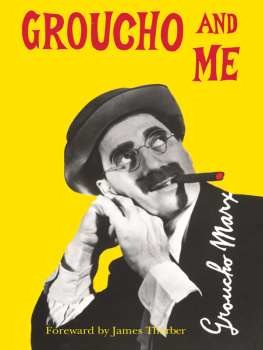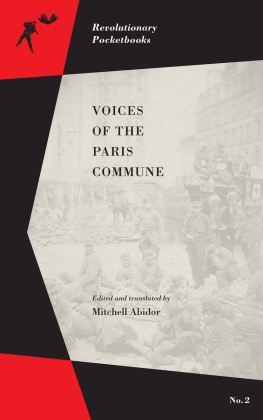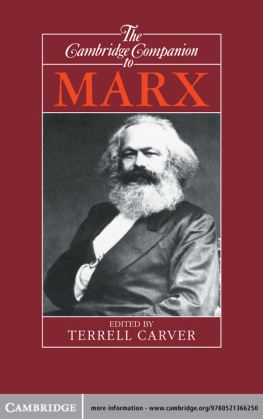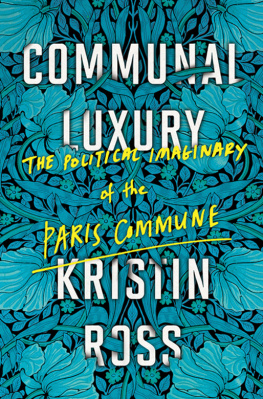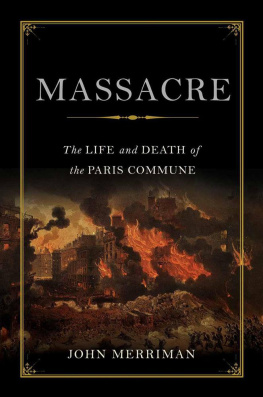Marx - The Paris Commune
Here you can read online Marx - The Paris Commune full text of the book (entire story) in english for free. Download pdf and epub, get meaning, cover and reviews about this ebook. City: New York;Paris (France);France;Paris, year: 2011, publisher: Barnes & Noble, genre: Science. Description of the work, (preface) as well as reviews are available. Best literature library LitArk.com created for fans of good reading and offers a wide selection of genres:
Romance novel
Science fiction
Adventure
Detective
Science
History
Home and family
Prose
Art
Politics
Computer
Non-fiction
Religion
Business
Children
Humor
Choose a favorite category and find really read worthwhile books. Enjoy immersion in the world of imagination, feel the emotions of the characters or learn something new for yourself, make an fascinating discovery.
The Paris Commune: summary, description and annotation
We offer to read an annotation, description, summary or preface (depends on what the author of the book "The Paris Commune" wrote himself). If you haven't found the necessary information about the book — write in the comments, we will try to find it.
The Paris Commune — read online for free the complete book (whole text) full work
Below is the text of the book, divided by pages. System saving the place of the last page read, allows you to conveniently read the book "The Paris Commune" online for free, without having to search again every time where you left off. Put a bookmark, and you can go to the page where you finished reading at any time.
Font size:
Interval:
Bookmark:
KARL MARX

This 2011 edition published by Barnes & Noble, Inc.
All rights reserved. No part of this publication may be reproduced, stored in a retrieval system, or transmitted, in any form or by any means, electronic, mechanical, photocopying, recording, or otherwise, without prior written permission from the publisher.
Barnes & Noble, Inc.
122 Fifth Avenue
New York, NY 10011
ISBN: 978-1-4114-4583-3
CONTENTS
The International Workingmen's Association on the Franco-Prussian War
The Civil War in France
Appendix
INTRODUCTION TO THE GERMAN EDITION
T HE invitation to prepare another edition of the address of the General Council of the International Workingmen's Association concerning the Civil War in France, and to preface it with an introduction, came to me quite unexpectedly. I can only, therefore, take up the most essential points and touch upon them very briefly.
I prefix the two shorter addresses of the General Council to the longer pamphlet on the Franco-Prussian War. Firstly, because in the pamphlet on the Civil War reference is made to the second address, which itself would not be intelligible without the first. Secondly, because these two addresses, which are also the work of Marx, are, not less than the Civil War, excellent specimens of that marvelous gift of the author, first exhibited in the Eighteenth Brumaire of Louis Bonaparte, of apprehending clearly the character, the import, and the inevitable consequences of great historical events, at the very time when these events are still unfolding themselves, or have only just taken place. And lastly because, as I write, the German people are still suffering from the evils consequent upon the events here considered, as clearly foreseen and foretold by Marx.
Has it not, indeed, come to a fulfilment, as predicted in the first address, that should Germany's war of defense against Louis Bonaparte degenerate into a war of conquest against the French nation, all the calamities that befell the German people after the so-called wars of liberation and the hounding of socialists, with the same police tyranny and the same revolting interpretation of legal texts?
And has it not come literally true, that the annexation of Alsace-Lorraine would "drive France into the arms of Russia," and that after this annexation Germany would either become the acknowledged vassal of Russia, or would have, after a short respite, to arm herself for a new war? And what a war? A "race war of the Germans against the coalesced Slavs and Latins"! Is it not a fact, that the annexation of the French provinces has driven France into the arms of Russia? Has not Bismarck for twenty years courted in vain the favor of the Czar, and lowered himself before him with even meaner servility than little Prussia, before she became the "first great power of Europe," had been accustomed to display at the feet of "Holy Russia"? And does not the "Damocles sword" overhang us of a war, on the first day of which all written treaties will be blown unto the wind like chaff; of a war as to which nothing is certain but the absolute uncertainty of its issue; of a race war which will expose all Europe to the devastation of fifteen or twenty millions of armed men, and which only hangs fire at present for the reason that even the strongest of the great military states shrinks before the absolute uncertainty of the final result?
All the more, therefore, is it our duty to render accessible to the German workingmen these brilliant but half-forgotten documents, which attest to the far-sightedness of the International's proletarian policy in connection with the events of 1870.
What applies to these two addresses, applies also to the one entitled The Civil War in France. On the 28th of May, the last of the combatants of the Commune were crushed by superior numbers on the heights of Belleville, and not more than two days passed, before Marx, on the 30th, read to the General Council of the International the pamphlet in question, in which the historical significance of the Paris Commune is presented briefly, but in words so powerful, so incisive, and above all, so true, that there is no equal to it in the whole range of the extensive literature on the subject.
Thanks to the economic and political development of France since 1789, Paris has for fifty years been placed in such a position that no revolution could there break out without assuming a proletarian character, in such wise that the proletariat, which had bought the victory with its blood, would immediately thereafter put forward its own demands. These demands were more or less indefinite, and even confused, in accordance with the particular degree of development to which the Paris workmen had attained at the time; but the upshot of them all was the abolition of the class contrast between capitalist and laborer. How this was to be done, 'tis true nobody knew. But the demand itself, however indefinite its form, was a danger for the existing order of society; the workmen who made it were still armed; if the bourgeoisie at the head of the State would maintain their political supremacy, they were bound to disarm the workmen. Accordingly, after every revolution made victorious with the arms of the workers, there arose a new struggle which ended with the defeat of the workers.
This happened for the first time in 1848. The Liberal bourgeoisie of the Parliamentary opposition held reform banquets in favor of an electoral change which should assure domination to their party. In their struggles with the Government driven to appeal ever more to the people, they were obliged to admit to the front rank the Radical and Republican elements of the small middle class as well as of the wealthier bourgeoisie. But behind these stood the revolutionary workmen; and the latter had, since 1830, acquired for themselves a far greater sense of political independence than even the Republicans among the middle classes suspected. In the moment of crisis between Government and Opposition, the workmen inaugurated the battle in the streets; Louis Philippe disappeared, and with him the electoral reform. In its stead arose the Republic, and moreover a republic designated by the victorious workmen themselves as the "Social Republic." As to what was to be understood by this "social" republic, nobody was quite clear, not even the workmen themselves. But they now had weapons, and wielded power in the State. So soon, therefore, as the bourgeois Republicans, who were at the head of affairs, began to feel somewhat firm ground under their feet, their first object was to disarm the workmen. To effect this, the bourgeoisie drove them to insurrection in June 1848, by the direct breach of pledges, by scornful and defiant treatment, and by the attempt to banish the unemployed into a distant province. The Government had taken care to have an overwhelming repressive force at hand. After five days of heroic struggle, the workmen succumbed, and now followed a massacre of the defenseless prisoners, the like of which had not been seen since the days of the Civil Wars which ushered in the downfall of the Roman Republic. It was the first time that the bourgeoisie showed to what a mad ferocity of vengeance it can be stirred up, so soon as the proletariat dares to stand up against it as a separate class with its own interests and demands. And yet 1848 was child's play compared with their fury in 1871.
But Nemesis straightway followed. If the proletariat could not as yet rule France, the bourgeoisie could not do so any more. At least, not at that time, when it was in its majority monarchical, and moreover split into three dynastic parties besides one Republican party. The internal dissensions of the bourgeoisie allowed the adventurer Louis Bonaparte to filch all positions of influencearmy, police, administrative machineryand, on December 2, 1851, to blow up the last stronghold of the bourgeoisie, the National Assembly. The Second Empire followed. It brought about the exploitation of France by a band of political and financial adventurers, but at the same time an industrial development such as had not been possible under the narrow and timid system of Louis Philippe, when France was under the exclusive domination of a mere fraction of the wealthier bourgeoisie. Louis Bonaparte took from the capitalists their political power, under the pretense, on the one hand, of protecting them against the workers, and on the other hand of protecting the workers against them; but, in return for this, his Government favored speculation and industrial activity, in short, the rise and enrichment of the whole of the capitalist class in a hitherto unheard of degree. Corruption and wholesale robbery, it is true, developed to a still greater extent at the Imperial Court and among its hangers-on, who exacted no trifling percentage of the new wealth accumulated by the bourgeoisie.
Font size:
Interval:
Bookmark:
Similar books «The Paris Commune»
Look at similar books to The Paris Commune. We have selected literature similar in name and meaning in the hope of providing readers with more options to find new, interesting, not yet read works.
Discussion, reviews of the book The Paris Commune and just readers' own opinions. Leave your comments, write what you think about the work, its meaning or the main characters. Specify what exactly you liked and what you didn't like, and why you think so.


